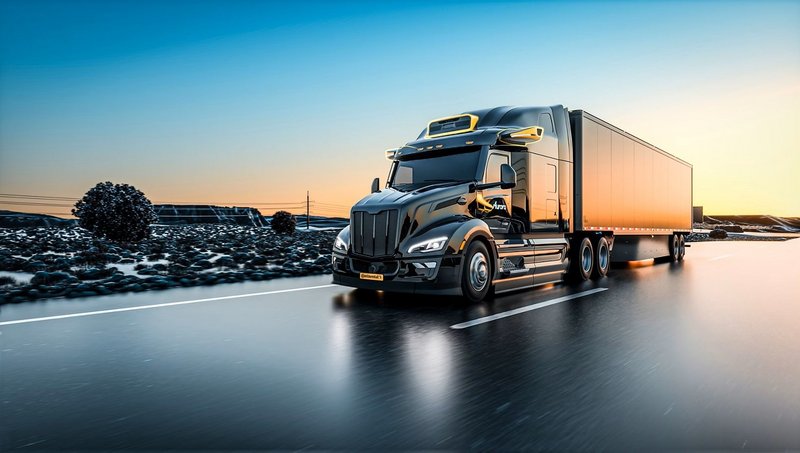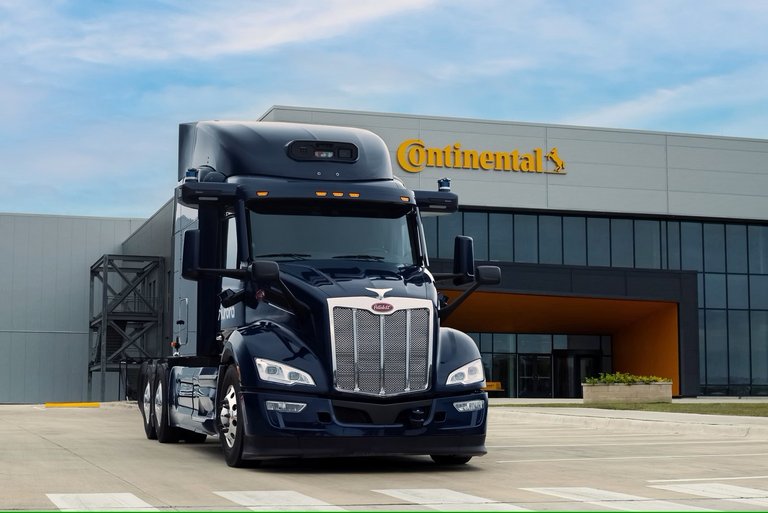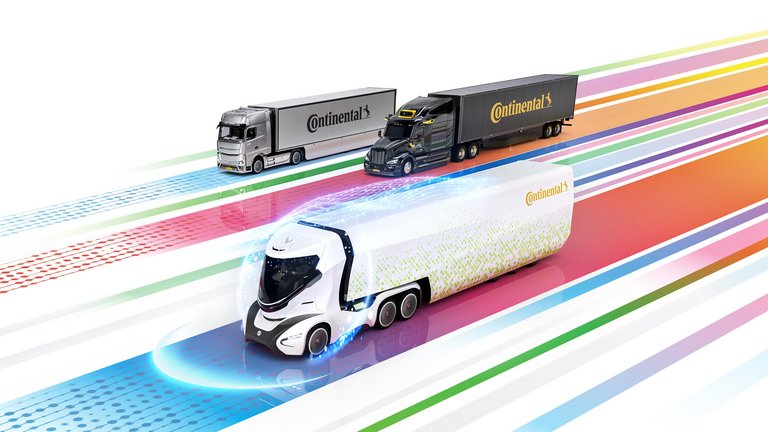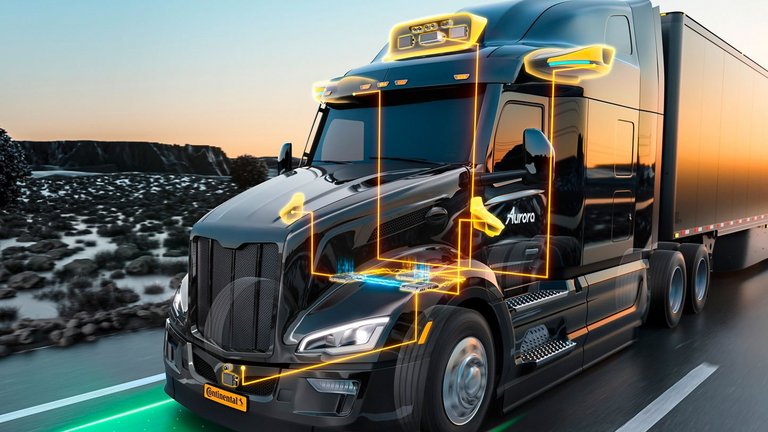Almost Half of Germans Expect Fewer Traffic Jams on Highways as a Result of Autonomous Trucks
- New mobility study from Continental in five countries shows high level of approval for self-driving trucks
- Majority in respective countries expect autonomous trucks to compensate for the shortage of drivers at transport companies and ease traffic flow
- Philipp von Hirschheydt, Executive Board member for the Automotive group sector: “The benefits of autonomous trucks are already being seen worldwide. At the same time, we take people’s safety concerns very seriously. With our technologies, we’re helping to further increase the acceptance of autonomous trucks”
- Continental and partner Aurora to have world’s first scalable autonomous truck system ready for production in the USA by the end of 2027
- Publication of the full study results in October 2024
Hanover, Germany, September 12, 2024. Autonomous trucks enjoy widespread acceptance, and many people believe they have a good chance of soon becoming a reality. These are the findings of the representative Mobility Study 2024 conducted by market research institute infas on behalf of Continental in Germany, China, France, Japan and the USA. In Germany, of the 1,000 people surveyed about their mobility needs, 47 percent of respondents believe that driverless trucks are likely in the near future. This expectation is more pronounced in the USA at 62 percent and in China at 92 percent. Many people expect concrete positive effects from this development. Almost 60 percent of respondents in Germany see autonomous trucks as a means of combating the shortage of drivers at transport companies. Moreover, almost half (47 percent) believe that autonomous trucks will improve the flow of traffic on highways and thus reduce the number of traffic jams in the future.
“We’re delighted that the majority of respondents already see the benefits of autonomous trucks. With our technologies, we’re helping to further increase this acceptance,” said Philipp von Hirschheydt, Executive Board member for the Automotive group sector. In Germany, people who use their car for longer distances (more than 100 kilometers) and younger people (up to age 44) are significantly more open to the idea of autonomous trucks than short-distance drivers and older respondents.
Solution for urgent problems in the logistics sector
In many countries, the transport industry is suffering from a huge shortage of drivers, while demand for goods transportation by road continues to grow. According to studies, Germany was short of at least 70,000 truck drivers in 2023, and the trend is rising. Furthermore, the switch to driverless trucks offers fleet operators the opportunity to significantly reduce operating costs and delivery times. Unlike a driver in the cab, a self-driving truck does not need to observe driving times or rest breaks and can spend significantly more time actually driving on the road. One benefit for society as a whole is that autonomous trucks have the potential to eliminate human error as the main cause of accidents and help increase road safety. Self-driving trucks also lower the burden on the environment: optimized driving performance reduces fuel consumption, making fleet CO2 targets achievable.
Systems architect Continental builds trust
However, the mobility study also reveals ongoing skepticism about the safety of heavy commercial vehicles without a person behind the wheel. In Germany, France and the USA, 60 to 65 percent of respondents have safety concerns, while in Japan the figure is more than 70 percent. There is less skepticism in China, where almost half of those surveyed have no concerns. China is also the only country where a majority of respondents (62 percent) ascribe a higher level of safety to autonomous trucks than to those with drivers (30 percent).
In its partnership with US company Aurora to develop autonomous trucks, Continental, as the exclusive partner, is contributing key components that meet the highest standards for the safe operation of self-driving trucks. These components predominantly include radar and camera sensors as well as jointly developed LiDAR sensors. They equip the entire vehicle with sensory organs to fully map the surroundings of the self-driving truck. Continental also supplies central control units for automated driving, high-performance computers (HPCs) with enormous computing power for processing the collected environmental data as well as a fallback level. Developed by Continental, the latter provides a second network for maximum safety. The specialized secondary system can take control in an emergency, stopping the truck safely; for example, if the sensors are damaged, impairing the primary system’s functionality.
“We take people’s safety concerns very seriously. The solution with a redundant system demonstrates that the safety and protection of all road users is Continental's top priority when it comes to autonomous driving. Our decades of expertise and the resulting success with technologies for automated driving in the passenger car sector are an incentive and the basis for us to achieve something similar for commercial vehicles and raise confidence in this form of mobility,” says von Hirschheydt, adding, “At this year’s IAA TRANSPORTATION, we will be presenting the central nervous system and sensory organs of our autonomous truck to visitors up close. We’re looking forward to the discussions at the show.” Driver assistance systems with sensors and cameras from Continental already help millions of car drivers around the world when parking, keeping in lane on the highway or emergency braking, for example.
Growing approval for automated car driving provides tailwind
Openness toward assistance systems is growing, as they become more widespread in modern vehicles. It is significantly more pronounced in Germany than it was in 2022. In China, almost all respondents have long considered assistance systems to be essential. Overall, Continental’s previous mobility studies over the 10-year period show an increasingly positive attitude toward automated passenger car driving in most of the countries surveyed. Since 2013, the share of respondents in the USA, China and Japan who think automated driving makes sense has increased significantly. In both Asian countries, approval has increased by 11 percentage points, reaching 90 percent in China in 2024 (72 percent in Japan). In the USA (56 percent), the rise is even more pronounced with an increase of 15 percentage points, whereas approval is stagnating in Germany. In 2024, it is just below the level of 11 years ago (2024: 49 percent, 2013: 53 percent). There are similar differences between the countries in their expectations of whether automated driving will be suitable for everyday use within the next five to 10 years. Here too, this expectation is significantly higher in China (82 percent), Japan (52 percent) and the USA (51 percent) than in the two European countries surveyed. Nonetheless, in 2024 the proportion of those in Germany and France who expect automated driving to be suitable for everyday use has also increased slightly compared with 2022.
The mobility study shows that the growing approval for automated driving with cars could provide a tailwind. Respondents in Germany whose cars were registered in 2020 or later, for example, are more likely to perceive automated driving as a useful development (approval of around 56 percent) than respondents with older cars (overall average of all respondents in Germany of around 51 percent). The same applies in this country to the question of whether automated driving will become part of everyday life within the next five to 10 years. With 47 percent in agreement, the group of drivers of cars registered in 2020 or later is also in the lead, well above the overall German average of around 38 percent. This suggests that respondents who come into greater contact with modern assistance systems are also more open to automated driving – a correlation that could represent a solid basis for basic acceptance of autonomous truck technology.
Continental and Aurora to bring autonomous trucks into production from 2027
Continental has been working with Aurora on developing and producing an autonomous Level 4 system for self-driving trucks since 2023. At the beginning of 2024, the two partners defined the system architecture and design of the central hardware and software system – an important milestone on the road to the start of production, which is planned for 2027 in the USA. The world’sfirst scalable Level 4 truck system will then go into production and enable the safe use of driverless trucks. Aurora has already been testing self-driving trucks on public highways there for a number of years.
Publication of the full study results in October 2024
The latest Continental Mobility Study, including the complete results from all five participating countries, will be published in October 2024. For the new edition, Continental commissioned infas to survey around 5,000 people aged 18 and over in Germany, China, France, Japan and the USA in August 2024 on their individual mobility needs and wishes as well as their trust in new technologies such as autonomous trucks. In each country, the respective sample is representative of the population; for China, it is representative of the urban population.
Experience Continental technologies at the IAA TRANSPORTATION
At the Continental booth C41 in hall 12 of the IAA TRANSPORTATION in Hanover from September 17 to 22, 2024, visitors can experience the company’s latest solutions for the commercial vehicle and transport industry and talk with experts.







